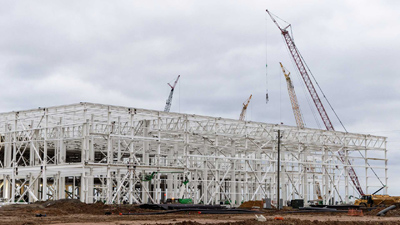Construction at Ford's new electric truck and battery manufacturing mega campus, BlueOval City, in West Tennessee is on track and projected to begin production in 2025.
InsideEVs toured the facility, currently just a massive construction project, and spoke with Ford reps about its progress.
The 3,600-acre site covers nearly 6 square miles of land and will create 6,000 new jobs, providing a huge boost to the local economy. To prepare the local workforce, the vast majority of which have never worked in the automobile manufacturing industry, Ford announced the introduction of a new training program called BlueOval Learning.
Ford describes BlueOval Learning as "a talent development program which will strengthen skills, provide teacher support and increase work-based learning experiences in West Tennessee."
As part of the BlueOval learning program, Ford will support K-12 schools and universities to expand existing STEM-related curricula and infrastructure and provide mechatronics training equipment and program development in Lauderdale, Haywood and Tipton counties.
Ford will collaborate with higher education institutions to provide training on advanced EV and battery manufacturing and partner with colleges and universities to develop work-based learning such as co-ops and internships.
Together with the State of Tennessee and ;the Tennessee Colleges of Applied Technology, Ford is developing the BlueOval City TCAT, a state-of-the-art training center, which will serve as a hub for education resources and best-in-class training programs.
BlueOval City: Building Ford's Electric Future
The $5.6 billion BlueOval City mega-complex will be Ford's largest, most costly facility yet, and integral to Ford's future success as the brand transitions to electric vehicles.
Ford is targeting a production run rate of 2 million EVs annually across the globe by late 2026. BlueOval City, at full capacity, will have the ability to pump out 500,000 electric trucks per year. Ford's biggest problem with its current electric truck, the F-150 Lightning, is the inability to make enough of them to satisfy demand.
The development of BlueOval City will also be Ford’s first carbon-neutral vehicle manufacturing and battery campus. The company's stated goal is to power all of its plants globally with renewable and carbon-free electricity by 2035.
“Project T3 is a once-in-a-lifetime opportunity to revolutionize America’s truck. We are melding 100 years of Ford truck know-how with world-class electric vehicle, software and aerodynamics talent. It will be a platform for endless innovation and capability,” said Jim Farley, Ford president and CEO.
Trust The Truck
Ford is currently developing its second-generation electric truck, which will be produced at the BlueOval City assembly plant. The company said its new facility will offer production efficiencies that allow a 30% smaller general assembly footprint than its traditional manufacturing plants while simultaneously delivering higher production capacity.
The codename for its next-gen all-electric truck is Project T3, short for “Trust The Truck," a name that stuck after its development team made it their rallying cry. The team's mission was to create an electric truck people can trust in the digital age---one that’s fully updatable, constantly improving and supports towing, hauling, exportable power and whatever new innovations owners will want.
BlueOval City is also developing an on-site supplier park that will house an upfit center that will be capable of adding in many of Ford truck's most popular features, including robotic spray-in bed liners and integrated toolboxes.
Little is known about Ford's next generation of electric trucks, due to hit the market in 2025, but we do know at least one of them will be made in BlueOval City.
Battery Production
BlueOval City will also be a major source of electric vehicle battery supply for both Ford and Lincoln EVs. Battery production for the on-site gigafactory will reach 43 GWh and is a joint venture with SK Innovation's SK On.
Ford and SK On are also building two additional battery plants in the neighboring state of Kentucky. Both plants will have the same 43 GWh output as BlueOval City in Tennessee, bringing the total capacity of the three plants to 129 GWh. The two Glendale, KY, facilities will combine to provide 5,000 new jobs to the area.










Abby Andrews